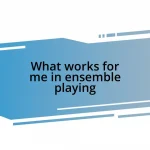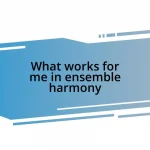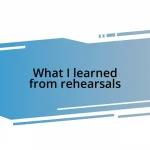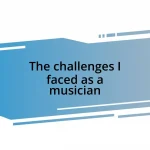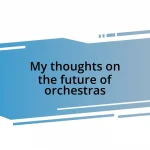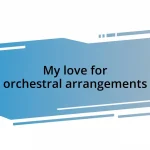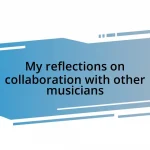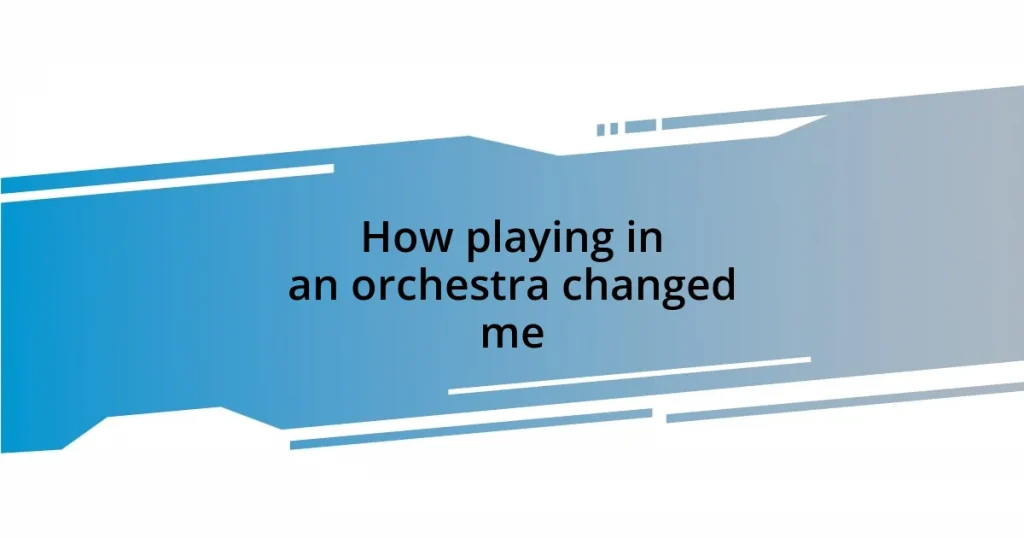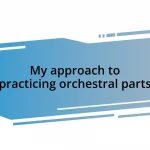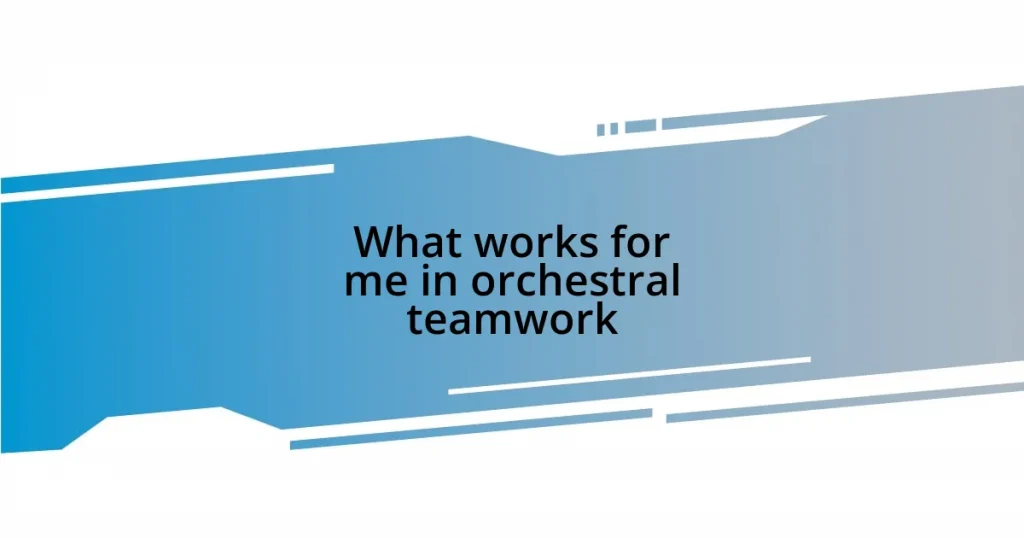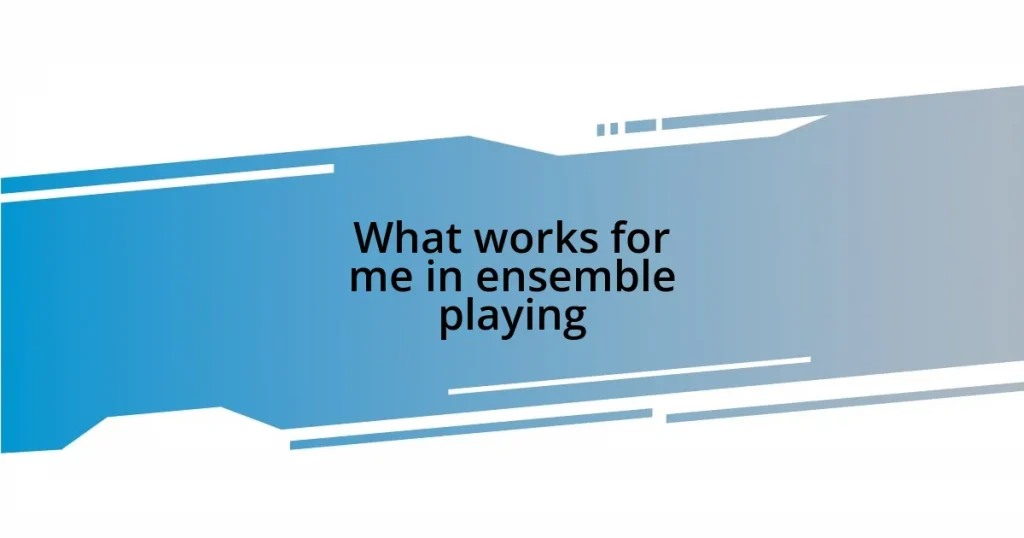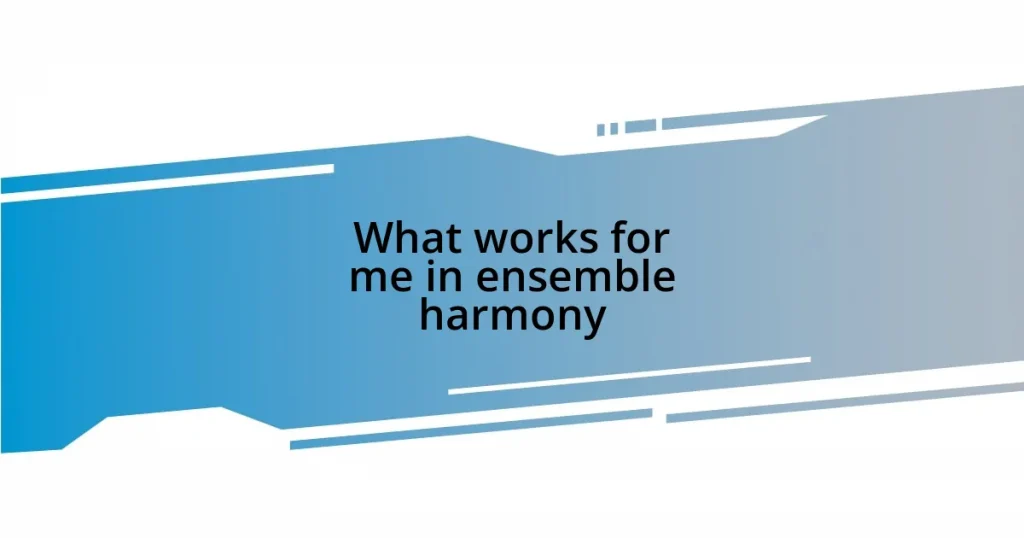Key takeaways:
- Collaboration in an orchestra fosters personal growth through trust, communication, and embracing vulnerability.
- Establishing discipline and structured practice routines enhances both musical skills and overall personal development.
- Building friendships within the orchestra creates a supportive community that enriches the musical experience and fosters joy.
- Live performances teach the importance of embracing imperfection and living in the moment, transforming mistakes into shared experiences.
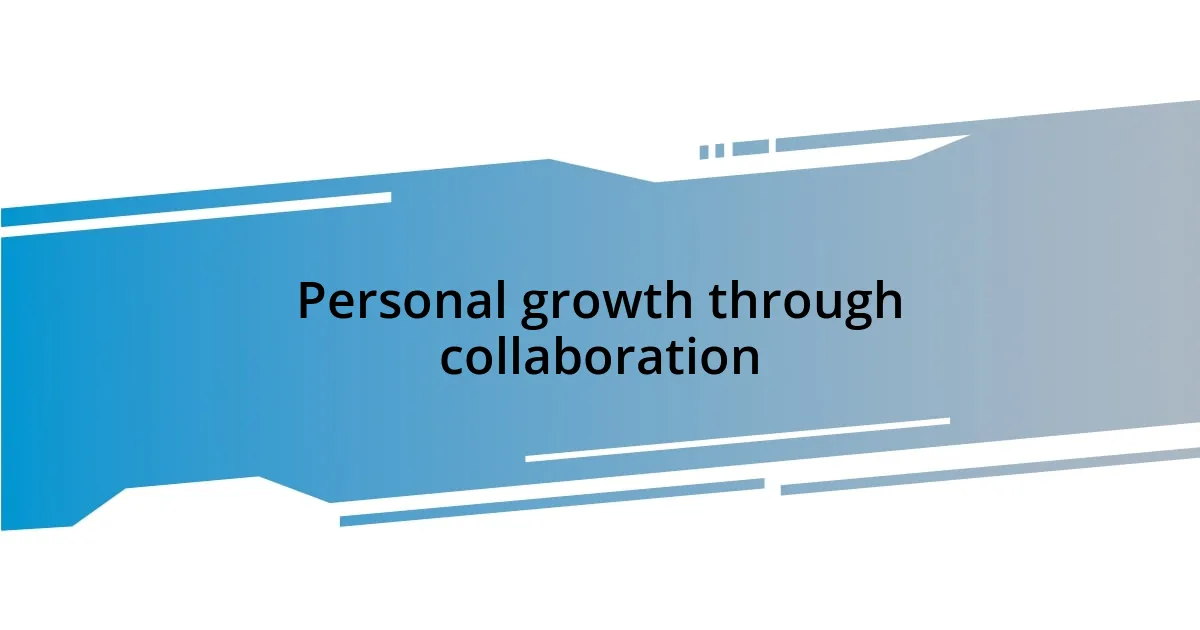
Personal growth through collaboration
Collaboration in an orchestra is a beautiful dance of trust and communication. I remember the first time I played alongside seasoned musicians; it felt daunting yet exhilarating. How could so many individual talents come together to create something far greater than the sum of their parts? This experience taught me that vulnerability isn’t a weakness; it’s a door to growth.
As I learned to adapt my playing style to blend with others, I discovered the power of compromise. There were moments in rehearsals when I had to step back, listen, and adjust my interpretation of a piece, which wasn’t easy. I reflected on how this mirrored life: sometimes, we must prioritize the group’s vision over our individual desires. This realization was profound—embracing collaboration reshaped my approach to challenges both in and out of music.
The emotional highs and lows shared during performances forged deep connections between players. I still reminisce about the electric atmosphere during our final concerts—everyone striving for perfection together. Isn’t it amazing how a collective goal can transform mere acquaintances into a family? That sense of belonging is a powerful catalyst for personal development, encouraging us to step outside our comfort zones and thrive.
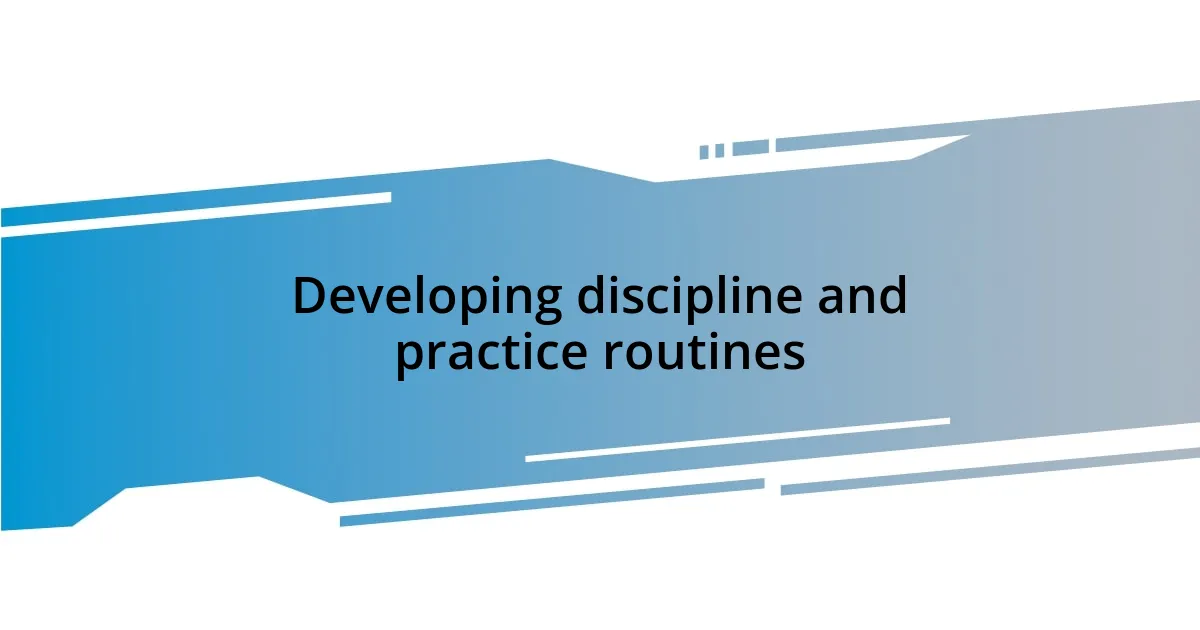
Developing discipline and practice routines
Developing discipline and practice routines in an orchestra taught me the value of consistency. I vividly remember the first time I committed to daily practice. Initially, it felt like a chore; however, as the days turned into weeks, I found myself anticipating those moments with my instrument. The structured environment of rehearsal solidified this routine, demonstrating that dedication can transform not just my skill, but also my mindset.
Along the way, I discovered that practicing wasn’t merely about repetition—it was about intentionality. I still recall when my conductor emphasized the importance of targeted practice. Instead of playing through an entire piece aimlessly, I learned to isolate difficult sections. This practice sharpened my focus, and soon enough, what once seemed insurmountable became achievable. Each breakthrough, even small ones, further solidified my commitment to discipline and fueled my passion for music.
The benefits didn’t stop with technical proficiency; they also seeped into other areas of my life. I began applying the same principles of discipline and perseverance to my studies and personal goals. I remember vividly the satisfaction of managing my time better, knowing that the effort I was putting into my music was directly enriching my overall development. This holistic growth underscored just how impactful a rigorous practice routine can be.
| Practice Aspect | Personal Experience |
|---|---|
| Daily Commitment | Developed anticipation for practice sessions |
| Targeted Approach | Isolated difficult sections for focused improvement |
| Application Beyond Music | Disciplined practice influenced my studies and personal goals |
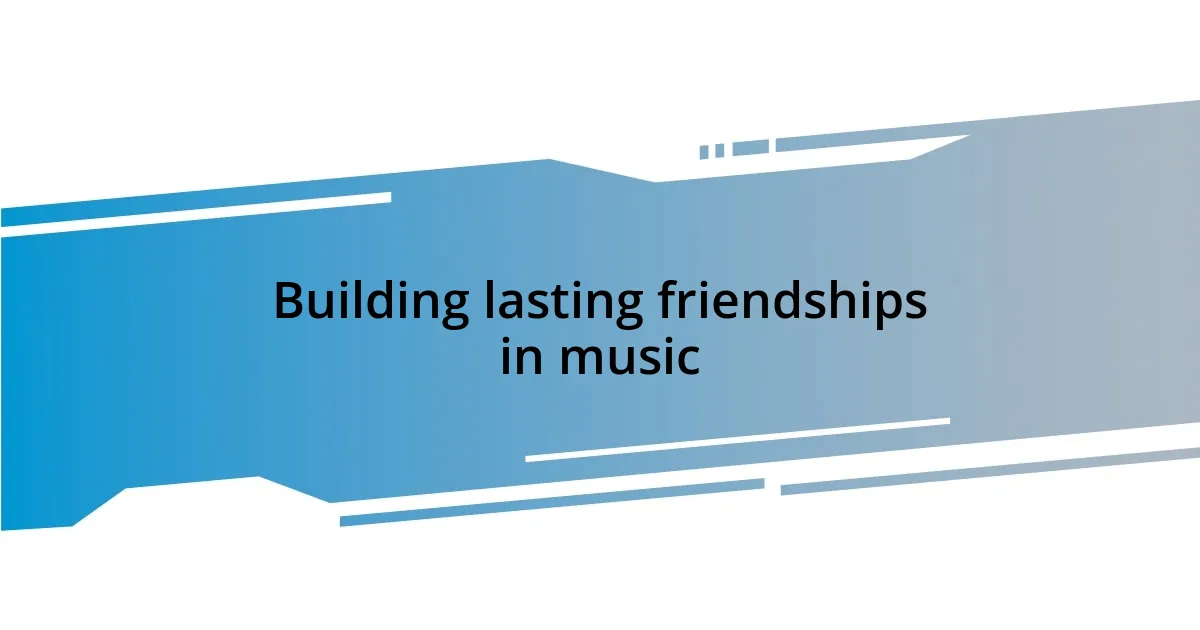
Building lasting friendships in music
Building friendships in music is one of the most rewarding aspects of playing in an orchestra. I recall my first rehearsal; I was nervous and unsure, yet my fellow musicians greeted me with warm smiles and genuine encouragement. Through shared struggles and triumphs, we quickly developed bonds that went beyond just notes on a page. Those friendships became a support system, where we celebrated achievements and navigated challenges together.
- The shared experience of preparing for concerts deepened our connections.
- We often held late-night practice sessions that turned into impromptu jam sessions and laughter-filled exchanges.
- I still treasure the memories of small group dinners after rehearsals, where music was just one part of the conversation—I learned about their lives, dreams, and passions.
These moments taught me that music isn’t just about the sound we create; it’s about the hearts and souls intertwined in the process. Each friendship enriched my artistic journey and offered a sense of community that I had never anticipated.
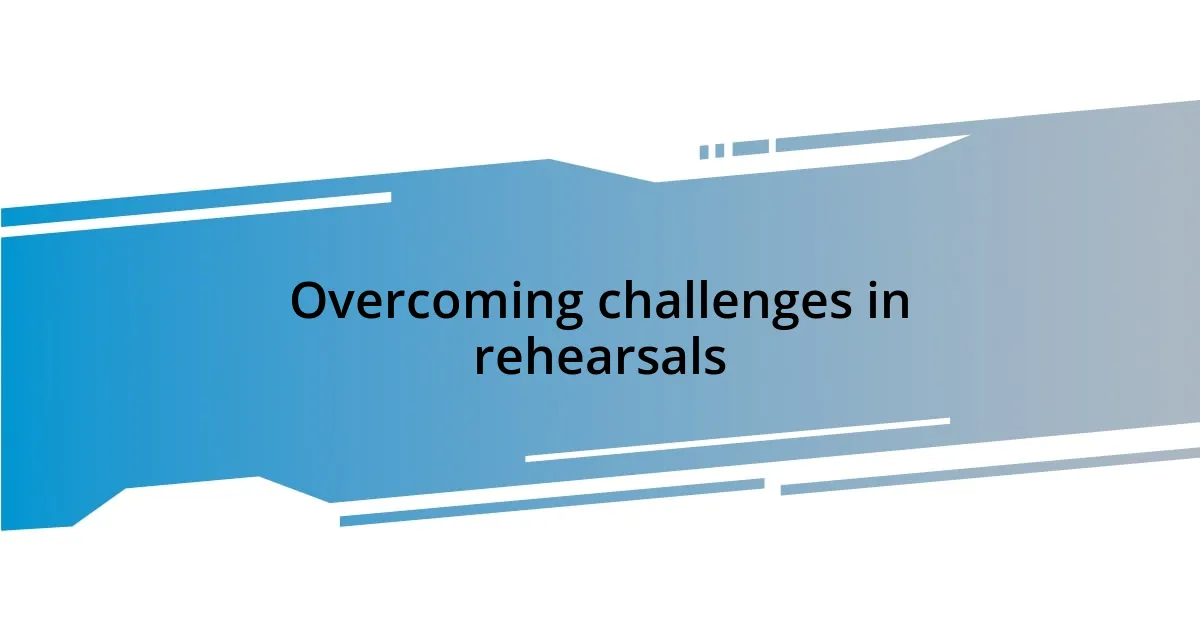
Overcoming challenges in rehearsals
One of the most daunting moments I faced during rehearsals was struggling with a particularly complex musical passage. I remember sitting in the back row, feeling overwhelmed as my section seemed to fly through it effortlessly. It made me question my skills, but then I realized that the challenge was an opportunity for growth. I began to break it down into smaller parts, practicing just a few measures at a time. This approach not only built my confidence but also taught me that persistence can turn frustration into mastery.
As rehearsals progressed, I discovered that communication was key to overcoming shared challenges. I vividly recall a time when our orchestra was preparing for a big concert, and we just weren’t clicking as a cohesive unit. It felt chaotic, and I could see that other musicians were feeling the strain too. So, I took the initiative to suggest we spend a few minutes discussing our concerns and strategies. That brief dialogue not only clarified our approach but also strengthened our connections as musicians. Isn’t it fascinating how just a little openness can transform tension into teamwork?
Then there were the actual performance jitters that hung over us like an unwelcome fog during those final rehearsals. I was often plagued by the fear of making a mistake, which, I’ll admit, was paralyzing. But each time I faced that fear, I found it helped me focus on the joy of playing rather than the anxiety of perfection. I relied on deep breaths and visualizing the audience’s appreciation, which helped me shift my mindset. Have you ever noticed how shifting your perspective can turn a nerve-wracking moment into a thrilling one?
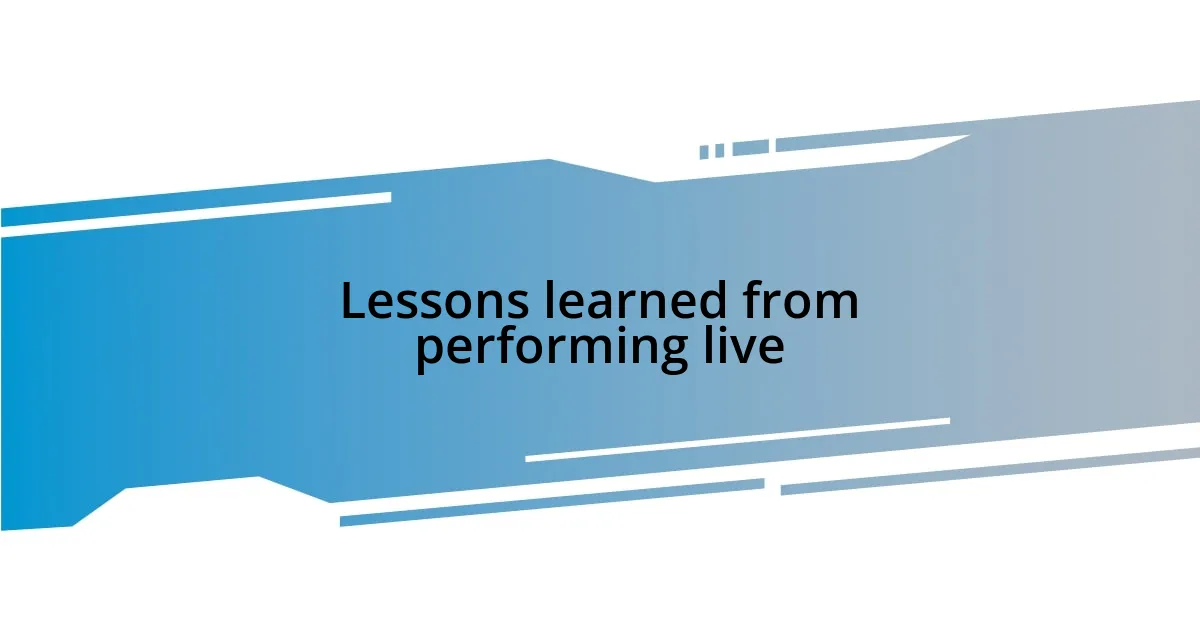
Lessons learned from performing live
When I first stood on stage, the lights shining down and the audience waiting in anticipation, I realized that performing live is all about embracing vulnerability. There’s something exhilarating yet terrifying about sharing your music with others, which pushes you out of your comfort zone. I vividly remember my heart racing as we began to play; it felt like a shared heartbeat among the musicians and the audience. Have you ever felt that rush of connection during a performance?
As the notes flowed and harmonies intertwined, I learned that every mistake made during a live performance tells a story. There was one concert where I missed a crucial entry, and for a split second, I felt the weight of panic. But when I glanced at my fellow players, I saw camaraderie in their expressions. We kept going, united by our passion for music. In that moment, I understood that perfection is less important than the spirit of collaboration. Isn’t it incredible how the energy in a room can transform a minor blunder into an unforgettable experience?
Finally, performing live has taught me the beauty of living in the moment. With every concert, I discovered that the energy of the audience feeds our performance. During one particular show, the audience’s enthusiastic applause after each piece felt like fuel, igniting my passion even more. It made me realize how music transcends time and space, creating a shared experience that lingers long after the last note is played. Can you recall a time when you lost yourself in the joy of participating in something greater?


